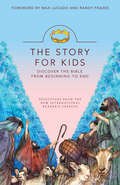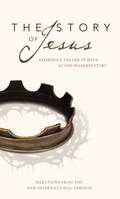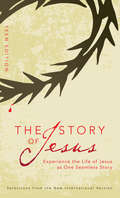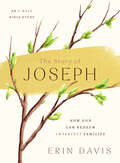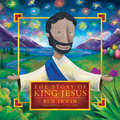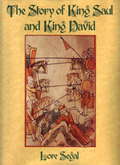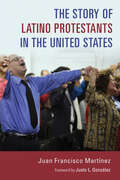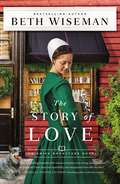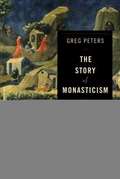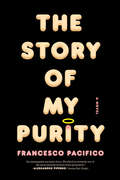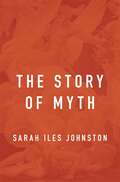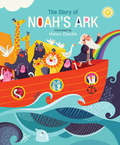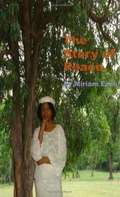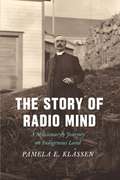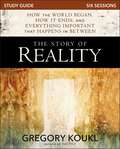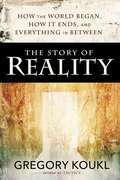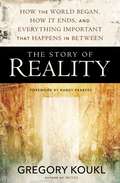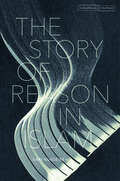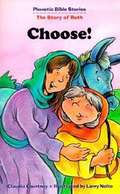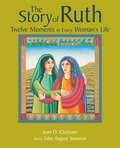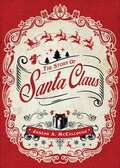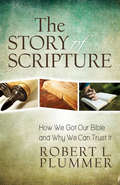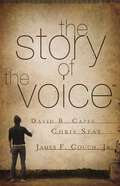- Table View
- List View
The Story of Jesus for Kids: Experience the Life of Jesus as one Seamless Story
by ZondervanThe Story of Jesus for Kids uses the clear, accessible language of the New International Reader's Version (NIrV) to tell the story of the most significant person who ever lived. Compelling and powerful, it’s also a compact, low-priced way to share the Jesus story in one seamless narrative. The Story of Jesus for Kids is one book that will be read again and again.
The Story of Jesus, NIV: Experience the Life of Jesus as One Seamless Story (The Story)
by ZondervanThe Story of Jesus is a short, easy-to-follow ebook that uses the clear, accessible language of the New International Version to offer a revealing, insightful look at the most significant human being who ever lived. Compelling and powerful, it shares Jesus' story in one seamless narrative. Whether it’s a gift, the basis for a group study, or just a keepsake for yourself, The Story of Jesus is one ebook you’ll enjoy again and again. NIV ©2011. The New International Version (NIV) translation of the Bible is the world’s most popular modern-English Bible—easy to understand, yet rich with the detail found in the original languages.
The Story of Jesus: Teen Edition
by ZondervanThis is a small, softcover booklet with a big message. The Story of Jesus: Teen Edition uses the clear, accessible language of the New International Version (NIV) to tell the story of the most significant person who ever lived. Compelling and powerful, it’s also a compact, low-priced way to share the Jesus story in one seamless narrative. The Story of Jesus: Teen Edition is one book that will be read again and again.
The Story of Joseph: How God Can Redeem Imperfect Families - An 8-Week Bible Study
by Erin DavisThe hope of redemption—for your family and mine.Family. Few words stir as much affection, and as much angst. You have hopes and dreams for your family. Everyone does. And yet each family tree holds gnarled branches of sin, disappointment, rebellion, and grief. There is brokenness in every family, but because no brokenness is too big for God, God can do a redemptive work in every family. In this 8-week study, Bible teacher Erin Davis guides you through the genealogy of Joseph. It&’s a messy story to be sure. But, ultimately, it&’s a shining example of beautiful, lasting, God-ordained redemption.As you dig into Joseph&’s family tree, you&’ll discover that even in the face of dysfunction, deceit, and deep pain, God is at work. He has a good plan.Family is God&’s idea. He wants to bless your family from generation to generation. As you gather with your family or friends and participate in this study, you&’ll find strength and hope—the Lord is building a beautiful family for His glory.
The Story of King Jesus
by Nick Lee Ben IrwinPeople of God pass their faith to the next generation by telling the story of how God rescues his children. This richly illustrated book continues to tell that story--from the creation of the world to Jesus's victory over death. Designed for children ages 4 to 8, The Story of King Jesus is the gospel told in a single story--a story meant to be read from start to finish in one sitting.The Story of King Jesus will captivate your child's imagination, nurture their spiritual curiosity, and draw them into the full Bible story as they embark on a lifetime of following Jesus the King.
The Story of King Saul and King David
by Lore SegalParents through the ages have read the Bible with their children, but much of its power and beauty is lost on contemporary readers, who find the old language obscure. Now by bringing us this great literature in clear modern English, The Story of King Saul and King David makes it possible for families to understand and appreciate it together. The biblical stories in this volume are tales of particular drama and pathos, as the text reveals the greatness and human weakness of these flesh-and-blood heroes who assume the stewardship of ancient Israel. The personalities of Saul, the first king of Israel, and his young protégé, David, continue to fascinate modern readers of all ages. Following the approach she used in The Book of Adam to Moses, a translation of the biblical stories of Genesis and Exodus, Lore Segal refuses to invent or simplify for a young audience. She has followed the narrative threads in a translation that is both graceful and precise, keeping the grandeur and wit of language, the music and mystery of these ancient texts. The Story of King Saul and King David is illustrated with 40 black-and-white reproductions from the Pamplona Bibles, two thirteenth-century illuminated manuscripts.
The Story of Latino Protestants in the United States
by Juan Francisco MartinezThe first major historical overview of one of America's most vibrant Christian movements <p><p>This groundbreaking book by Juan Francisco Martínez provides a broad historical overview of Latino Protestantism in the United States from the early nineteenth century to the present. Beginning with a description of the diverse Latino Protestant community and a summary of his own historiographical approach, Martínez then examines six major periods in the history of American Latino Protestantism, paying special attention to key social, political, and religious issues—including immigration policies, migration patterns, enculturation and assimilation, and others—that framed its development and diversification during each period. <p><p>He concludes by outlining the challenges currently facing Latino Protestants in the United States and considering what Latino Protestantism might look like in the future. Offering vital insights into key leaders, eras, and trends in Latino Protestantism, Martínez's work will prove an invaluable resource for all who are seeking to understand this rapidly growing US demographic.
The Story of Love: An Amish Christmas Bakery Story (The Amish Bookstore Novels #2)
by Beth WisemanThey come from different backgrounds . . . But are they destined to write a new chapter together?With little left to tie her to her home state of Texas and yearning for a slower life, Yvonne Wilson jumps at the chance to shake things up with a move to Montgomery, Indiana. A dream job awaits her—managing an Amish bookstore for her good friends Jake and Eva. Besides the slow-paced setting and the comfort of beloved books, Yvonne hopes the change will help distract her from the emptiness she feels after the death of her fiancé.No longer a part of the Amish community but still a resident of Montgomery, Abraham Byler finds himself in over his head with his job as a police officer combined with a new but fast-moving relationship with the wealthy and aggressive New York native Brianna Stone. When Abraham realizes that his old crush Yvonne is back in town, he&’s not just in over his head—he suddenly finds himself head over heels for Yvonne—and in hot water with Brianna.When the violence of police work comes up against his pacifist upbringing, Abraham is forced to question his original decision to leave the Amish faith for his career. Meanwhile, Yvonne is asking her own questions about why she feels such a deep peace in Montgomery—and how much that feeling has to do with Abraham and how much has to do with the workings of her own heart.&“This compelling unpredictable romance between two strong characters with complicated lives plays out beautifully, one unexpected turn after another.&” —Patricia Davids, USA TODAY bestselling author of Amish romanceSweet contemporary Amish romanceBook 1: The Bookseller's Promise; Book 2: The Story of Love; Book 3: Hopefully Ever AfterBook length: 80,000 wordsIncludes discussion questions for book clubs
The Story of Monasticism: Retrieving an Ancient Tradition for Contemporary Spirituality
by Greg PetersAt the same time, contemporary evangelical spirituality desires historical Christian manifestations of the faith. In this accessibly written book Greg Peters, an expert in monastic studies who is a Benedictine oblate and spiritual director, offers a historical survey of monasticism from its origins to current manifestations.
The Story of My Purity: A Novel
by Francesco PacificoAn exuberant tale of a man caught between faith and freedom, from one of Italy's most talented young novelists Thirty years old, growing flabby in a sexless marriage, Piero Rosini has decided to dedicate his life to Jesus. He's renounced the novels and American music that were filling his head with bullshit; he's moved out of his fancy bourgeois neighborhood, which was keeping him from finding spiritual purity and the Lord's truth. Now that he and his wife have settled into an unfinished housing development on the far outskirts of Rome, he'll be able to really concentrate on his job at an ultraconservative Catholic publishing house, editing books that highlight the decadence and degradation of modern society, including one claiming that Pope John Paul II was secretly Jewish. But Piero is suffocating. He worries that The Jewish Pope might be taking things too far. He can't get his beautiful sister-in-law out of his head. Temptations are breaking down his religious resolve. He decides to flee to Paris, which turns out not to be the best way of guarding his purity. With a charismatic narrator as familiar with the finer points of Christian theology as with the floor layout of IKEA and the schedules of European budget airlines, Francesco Pacifico's exuberant novel brings us Europe old and new and the inner workings of a conflicted but always compelling mind. The Story of My Purity is fiction with great humor, intelligence, neuroticism, and vision, from a young writer at the beginning of a tremendous career.
The Story of Myth
by Sarah Iles JohnstonSarah Iles Johnston argues that the nature of myths as gripping tales starring vivid characters enabled them to do their most important work: sustaining belief in the gods and heroes of Greek religion. She shows how Greek myths—and the stories told by all cultures—affect our shared view of the cosmos and the creatures who inhabit it.
The Story of Noah's Ark
by Helen DardikA long time ago, the people of the world were not treating each other kindly. God was very sad, and so he decided to send a flood to cover the entire world. However, one man, Noah, and his family were very good people, so God told Noah to build a big boat and to gather two of every kind of animal to be kept safe in the boat when the floor arrived. Noah did as God commanded and soon he, his family, and all the animals were drifting in the flood waters. After many weeks of waiting, the flood went away and Noah, his family, and the animals were able to again return to land. God set a rainbow in the sky, promising Noah that he would never again flood the earth.Share this remarkable and classic Bible story with young ones with this delightful new picture book. With stunning art by Helen Dardik, and simplified text for little readers, The Story of Noah's Ark is sure to become a favorite for families.
The Story of Peace
by Miriam EzehPeace is a young woman whose life is turned upside down after her parents are killed in a tribal war that leaves her to raise her younger brother, Lawrence. As Lawrence grows, so does his interest in revenging his parents' death. Peace, however, holds fast to her faith and trust in Christ and does her best to shield Lawrence from the tribal wars and his own drive for revenge. Peace's life is made all the more complicated by John, a young doctor from the states who has decided to make his mother's homeland his own. "The Story of Peace" is a story of right relationships, chaste love, and the Truth of Christ. It is a story that draws in readers of all ages and is a wonderful book for teens as well as adults.
The Story of Radio Mind: A Missionary's Journey on Indigenous Land
by Pamela E. KlassenAt the dawn of the radio age in the 1920s, a settler-mystic living on northwest coast of British Columbia invented radio mind: Frederick Du Vernet—Anglican archbishop and self-declared scientist—announced a psychic channel by which minds could telepathically communicate across distance. Retelling Du Vernet’s imaginative experiment, Pamela Klassen shows us how agents of colonialism built metaphysical traditions on land they claimed to have conquered. Following Du Vernet’s journey westward from Toronto to Ojibwe territory and across the young nation of Canada, Pamela Klassen examines how contests over the mediation of stories—via photography, maps, printing presses, and radio—lucidly reveal the spiritual work of colonial settlement. A city builder who bargained away Indigenous land to make way for the railroad, Du Vernet knew that he lived on the territory of Ts’msyen, Nisga’a, and Haida nations who had never ceded their land to the onrush of Canadian settlers. He condemned the devastating effects on Indigenous families of the residential schools run by his church while still serving that church. Testifying to the power of radio mind with evidence from the apostle Paul and the philosopher Henri Bergson, Du Vernet found a way to explain the world that he, his church and his country made. Expanding approaches to religion and media studies to ask how sovereignty is made through stories, Klassen shows how the spiritual invention of colonial nations takes place at the same time that Indigenous peoples—including Indigenous Christians—resist colonial dispossession through stories and spirits of their own.
The Story of Reality Study Guide: How the World Began, How it Ends, and Everything Important that Happens in Between
by Gregory KouklStudy the narrative backbone of the Christian story and how all the plotlines of that story are resolved in the end.Biblical Christianity is more than just another private religious view. It's more than just a personal relationship with God or a source of moral teaching. Christianity is a picture of reality. It explains why the world is the way it is. When the pieces of this puzzle are properly assembled, we see the big picture clearly.This six-session, video-based study guide (DVD/streaming video sold separately)—based on the theological observations of his book, The Story of Reality—Gregory Koukl guides you and your group through the narrative arc of reality. Throughout this experience, you'll learn:The vital answer to the question: What is Christianity?The five basic elements forming the plotline of the entire Christian story.How the Christian story explains why there's evil in the world.The precise reason why Jesus is the only way of salvation.Why biblical faith is not a leap of wishful thinking.Reasons why the story's record of the life and resurrection of Jesus is reliable.How the biblical view of reality is the best explanation for the way things are.This video-based study is designed to be experienced in a group setting or any small gathering and includes outlines of the video teachings, reflections, self-assessment exercises, discussion questions, and other activities to help you understand the concepts and put them into practice.Participants in this course will come away with a more grounded understanding of biblical reality and a greater appreciation for the Christian tradition.The Story of Reality Video Study (9780310100751) sold separately.
The Story of Reality: How the World Began, How It Ends, and Everything Important that Happens In Between
by Gregory KouklBiblical Christianity is more than just another private religious view. It's more than just a personal relationship with God or a source of moral teaching. Christianity is a picture of reality. It explains why the world is the way it is. When the pieces of this puzzle are properly assembled, we see the big picture clearly. Christianity is a true story of how the world began, why the world is the way it is, what role humans play in the drama, and how all the plotlines of the story are resolved in the end. In The Story of Reality, bestselling author and host of Stand to Reason, Gregory Koukl, explains the five words that form the narrative backbone of the Christian story. He identifies the most important things that happen in the story in the order they take place: God Man Jesus Cross Resurrection If you are already a Christian, do you know and understand the biblical story? And for those still seeking answers to the questions of life, this is an invitation to hear a story that explains the world in a way nothing else will. This story can change your life forever.
The Story of Reality: How the World Began, How It Ends, and Everything Important that Happens in Between
by Nancy Pearcey Gregory KouklBiblical Christianity is more than just another private religious view. It’s more than just a personal relationship with God or a source of moral teaching.Christianity is a picture of reality.It explains why the world is the way it is. When the pieces of this puzzle are properly assembled, we see the big picture clearly. Christianity is a true story of how the world began, why the world is the way it is, what role humans play in the drama, and how all the plotlines of the story are resolved in the end.In The Story of Reality, bestselling author and host of Stand to Reason, Gregory Koukl, explains the five words that form the narrative backbone of the Christian story. He identifies the most important things that happen in the story in the order they take place:GodManJesusCrossResurrectionIf you are already a Christian, do you know and understand the biblical story? And for those still seeking answers to the questions of life, this is an invitation to hear a story that explains the world in a way nothing else will. This story can change your life forever.
The Story of Reason in Islam
by Sari NusseibehIn The Story of Reason in Islam, leading public intellectual and political activist Sari Nusseibeh narrates a sweeping intellectual history--a quest for knowledge inspired by the Qu'ran and its language, a quest that employed Reason in the service of Faith. Eschewing the conventional separation of Faith and Reason, he takes a fresh look at why and how Islamic reasoning evolved over time. He surveys the different Islamic schools of thought and how they dealt with major philosophical issues, showing that Reason pervaded all disciplines, from philosophy and science to language, poetry, and law. Along the way, the best known Muslim philosophers are introduced in a new light. Countering received chronologies, in this story Reason reaches its zenith in the early seventeenth century; it then trails off, its demise as sudden as its appearance. Thereafter, Reason loses out to passive belief, lifeless logic, and a self-contained legalism--in other words, to a less flexible Islam. Nusseibeh's speculations as to why this occurred focus on the fortunes and misfortunes of classical Arabic in the Islamic world. Change, he suggests, may only come from the revivification of language itself.
The Story of Ruth: Choose! (Phonetic Bible Stories)
by Claudia CourtneyIn this easy-to-read text, children learn the double "oo" sound in choose. They learn to recognize this sound and its different spellings. Along the way, young readers learn about Ruth, a woman whose acts of love have inspired many. Other books in this series are available in this library.
The Story of Ruth: Twelve Moments in Every Woman's Life
by Joan ChittisterIn this beautiful book best-selling author Joan Chittister and celebrated artist John August Swanson together reclaim the ancient story of Ruth as a model for contemporary women seeking a fully spiritual life.In concert with Swanson's rich and evocative art, Chittister's graceful prose explores, through this powerful biblical story, a series of twelve defining moments in every woman's life — moments of loss, change, transformation, aging, independence, respect, recognition, insight, empowerment, selfdefinition, invisibility, and fulfillment.A lovely blend of art and text, The Story of Ruth offers inspiration for women seeking wholeness and presents compelling devotional images for eyes and mind alike.
The Story of Santa Claus
by Joseph McculloughThe perfect Christmas gift, this beautiful book explains how the bearded, red clad, big bellied, reindeer driving jovial gent came to be the face of Christmas, and reveals the origins of Saint Nicholas - over seventeen hundred years ago in the Eastern Roman Empire. In a winding, magical tale filled with mystery and good will towards all men, Joseph McCullough travels across Europe (and the North Pole... of course) to uncover the exploits of Santa in a book that is sure to fill even the most jaded scrooges with a little bit of Christmas magic.And for any nervous parents out there - don't worry, there are no Father Christmas 'spoilers' between the pages of this book - ensuring the wonderous children's whisperings of Santa will continue... for another couple of years at least!
The Story of Scripture: How We Got Our Bible and Why We Can Trust It
by Robert L. PlummerAn excellent primer for those who want to understand who the original writers of the Bible were, how the books of the Bible came together, how we can be sure that the Bible is authoritative, and what the differences are between modern translations. Author Robert Plummer writes with a warm style in an accessible "big questions" format.
The Story of The Voice
by David Capes Jr.Step into the story behind "the story." Discover the reasons behind and the vision for The Voice translation! In-depth interviews with key participants explain the translators' motivations and visions for the project. Learn how the translators worked to bring a balance between scholarship, literary style, and forward thinking to meet the scripture needs for the church.Features include:Discussion of how The Voice makes the Bible accessible to new believersExplanation of The Voice's unique style and featuresExamples illustrate how scholars worked through the Hebrew and Greek texts of the BibleFirsthand accounts of The Voice translation project
